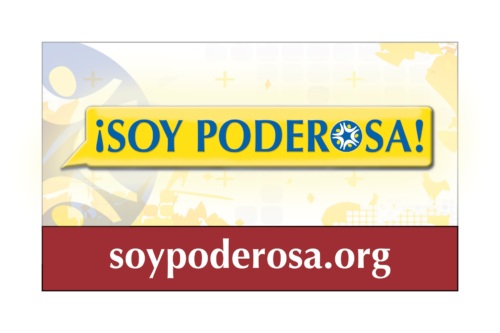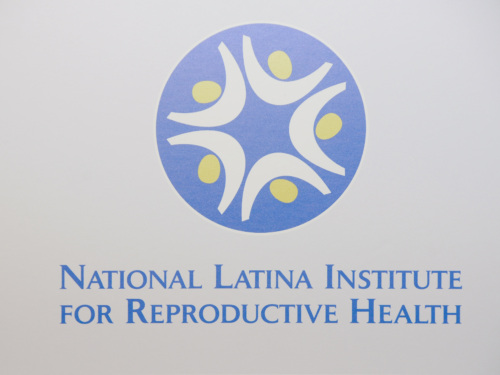Latina Institute releases post-Dobbs analysis
With the National Partnership for Women & Families, we released a report that found state abortion bans threaten 6.5 million Latinas, the largest group of women of color living under bans
National Latina Institute for Reproductive Justice fights for equal access to reproductive health for our communities because all of us should have the power to make informed decisions about our bodies, families, and futures.
We envision a world where Latines can thrive; are free to exercise our power to make decisions about our bodies, lives, and families; and can fully express our sexualities and genders.
We demand health, dignity, and justice for our communities. We center and amplify Latine voices as we work to transform oppressive systems and narratives and to reclaim control over our bodies and lives. We build power by organizing our activist base; shaping and advocating for policy change; and shifting culture to achieve
Reproductive Justice.
To achieve our vision of freedom and justice, we are guided by the
following values:
Transformational:
We focus on building power to transform individuals, communities, and society. Core to our organizing is creating transformational spaces that shift culture, deepen awareness, and activate our community.
Community-centered:
We are committed to centering the experiences of our Poderoses and Latine community members in our quest to achieve Reproductive Justice.
Inclusive:
We work to create brave spaces grounded in our values to include the diversity of the Latine community that accounts for differences in our race and culture, linguistic abilities, gender identity, sexuality, and worldviews.
Groundbreaking:
We break down barriers to spaces of power and innovate ways to continuously include, elevate and address the voices, experiences and needs of Latine communities.
Anti-racism:
We challenge internal and external white supremacy and strive to combat anti-blackness and anti-indigeneity in Latine spaces and culture.
Learning:
Our movement is quickly evolving, and our work requires that we be constant learners, always seeking to self-evaluate, grow and improve in order to meet the moment.
With the National Partnership for Women & Families, we released a report that found state abortion bans threaten 6.5 million Latinas, the largest group of women of color living under bans
With National Women’s Law Center, National Asian Pacific American Women’s Forum, and Sister Love, Inc., we submitted an amicus brief to support the immigrant women who were detained by ICE at the Irwin Detention Center in Georgia who were subjected to non-consensual, medically unnecessary, gynecological tests.
To adapt to the COVID-19 pandemic, we expanded our digital engagement efforts and launched our national Poderosa Mountain base-building program.
The National Latina Institute for Reproductive Health rebrands to the National Latina Institute for Reproductive Justice to better reflect our mission and what drives us: our commitment to build power in Latina/x communities and fight for reproductive justice.
Lupe M. Rodriguez becomes the new Executive Director to lead Latina Institute. Lupe is a scientist with an activist heart dedicated to seeing all people live in full salud, dignidad, y justicia.
Nearly 300 activists of color representing more than 20 states gathered for the first ever joint advocacy summit around reproductive justice. The activists met with more than 100 lawmakers to discuss legislation to advance abortion access and immigrant health.
Latina Institute Texas team organized a lobby day in Austin, TX to advocate for Rosie’s Law. Twenty activists attended from Houston, Corpus Cristi, RGV, and Austin making 44 legislative visits.
With research firm, PerryUndem Research/Communications, we explored Latina/o voters’ views and experiences toward contraception and abortion care.
Latina Institute hosted it’s National Advocacy Summit in Washington, DC to empower and engage Latina leaders in the reproductive justice movement.
We submitted the first amicus brief in our organization’s history to the U.S. Supreme Court in support of the petitioners in Whole Woman’s Health v. Hellerstedt, outlining Texas abortion law, HB2’s devastating impact on the 2.5 million Latinas of reproductive age in Texas.
The Intersections of Our Lives is a collaborative of three organizations (Latina Institute, National Asian Pacific American Women’s Forum and In Our Own Voice: National Black Women’s Reproductive Justice Agenda) representing women of color focused on addressing reproductive justice issues.
With research firm, PerryUndem Research/Communications, we conducted a nationwide poll on Latino/a voters attitudes on abortion. The poll found 8 in 10 Latino/a voters agree that a person should be able to make their own decisions about abortion without politicians interfering.
Latina Institute brought 48 advocates from 10 state for advanced training and advocacy. The weekend included legislative visits with lawmakers and our 20th anniversary gala celebration.
As a part of our first National Advocacy Weekend, Latina Institute hosted our 20th anniversary gala in Washington, DC. The gala ¡SOMOS PODEROSAS! Mobilizing our Communities for Salud, Dignidad y Justicia honored our work and allies.
The DMV (DC, Maryland, Virginia) LOLA became the Virginia Latina Advocacy Network (VA LAN) to gain a stronger footing in Virginia to mobilize the Latina/x community. The VA LAN quickly cultivated relationships with state-level repro organizations.
As a part of the “Nuestro Texas” campaign, Texas activists went all the way to the United Nations Human Rights Committee in Geneva, where their testimony supported access to healthcare as a human right.
After years of organizing as MI LOLA (Miami International LOLA), activists in the Miami-Dade area established the Florida Latina Advocacy Network (FL LAN) and began working on community civic engagement campaigns.
The “Nuestra Voz, Nuestra Salud, Nuestro Texas: The Fight for Women’s Reproductive Health in the Rio Grande Valley” is a human rights campaign with Center for Reproductive Rights calling for reproductive health access for all, regardless of zip code, ethnicity, race, income, or immigration status.
To celebrate the 40th anniversary of Roe v. Wade, we launched “Ye Te Apoyo” as a result of our polling that revealed that Latinos hold compassionate views on abortion and that our community supports each other.
“Soy Poderosa” launched as a civic engagement campaign created to engage, organize, and lift the voices of the Latina/x community, regardless of immigration status and ability to vote, as we continue to mobilize a broad constituency in support of reproductive justice. Our activists are our Poderosas.
In Charlotte, NC, we hosted the Southern Regional LOLA training with activists from 8 states: Alabama, Florida, South Carolina, Georgia, Kentucky, and Virginia. The LOLA led to the creation of a Latina Advocacy Network in DC, Maryland, and Virginia.
Latina Institute with Lake Research Partners released polling that found that Latino registered voters hold compassionate views on abortion. Our polling found a strong majority also agrees with a person’s right to make her own decisions about abortion without interference from politicians.
After initially coming together in 2007, activists in the Rio Grande Valley established the Texas Latina Advocacy Network (TX LAN). The TX LAN worked on obtaining transportation access and mobilizing around Health Care Reform by sending letters, making calls, and meeting with lawmakers.
Jessica González-Rojas became the Executive Director after 15 years experience in progressive movements.
Latina Institute brought 31 activists together in Washington, DC for a training on policy, advocacy, and lobbying, ending with 35 legislative visits with lawmakers to discuss reproductive health issues.
In conjunction with California Latinas for Reproductive Justice (CLRJ) and Colorado Organization for Latina Opportunity and Reproductive Rights (COLOR), we launched the first Latina Week of Action for Reproductive justice with to highlight Latina activism.
Latina Institute brought activists together to make 33 visits to lawmakers to advocate on behalf of Latinas/xs, their families, and their communities.
Latina Institute celebrated its 15th anniversary with a quinceañera celebration filled with music, live performances, food, drinks, and great company.
The Latina Organizing for Leadership and Advocacy (LOLA) trainings in Miami led to the creation of the Florida Latina Advocacy Network (now Latina Institute Florida) and in the Rio Grande Valley led to the Texas Latina Advocacy Network (now Latina Institute Texas).
Latina Institute brought together 36 activists from 9 states in Washington, DC for training and strategizing, which ended with activists making 33 visits to their lawmakers to talk about important immigration and reproductive health legislation.
Twenty Latina Advocacy Networks members convened in Washington, DC for a weekend of training and strategizing, which ended in a legislative advocacy day on Capital Hill where activists met with lawmakers to talk about reproductive health issues.
The National Coalition for Immigrant Women’s Rights was co-led by Latina Institute, National Asian Pacific American Women’s Forum, Women’s Refugee Commission, and National Organization for Women.
Latina Institute launched an advocacy campaign against the Hyde amendment, which restricts federal funding for abortion for Medicaid recipients.
Instantes Fall 2006
Latina Institute hosts the first Latina Organizing for Leadership and Advocacy (LOLA) training which resulted into the establishing the New York Latina Advocacy Network (now Latina Institute New York).
Latina Institute led in the development of the March for Women’s Lives on April 25. Women of color reproductive justice groups ensured that the march was inclusive and intersectional. We also hosted the Latina Summit, a pre-conference to the march.
Latina Institute established its new headquarters in Brooklyn, NY with Silvia Henriquez as the Executive Director.
Latina Institute organized various regional summits and meetings with the southwest regional meeting becoming the Colorado Organization for Latina Opportunity and Reproductive Rights (COLOR) – now a sister state-based organization!
The National Latina Institute for Reproductive Health is founded from the Latina Initiative with Arecely Panameño as Executive Director. Latina Institute was based in Washington, DC.
Catholics for Free Choice launches Latina Initiative, which later becomes the Latina Institute, to provide assistance to Latina/x organizations on reproductive health issues and to promote Latinas/xs in the fight for reproductive freedom.

